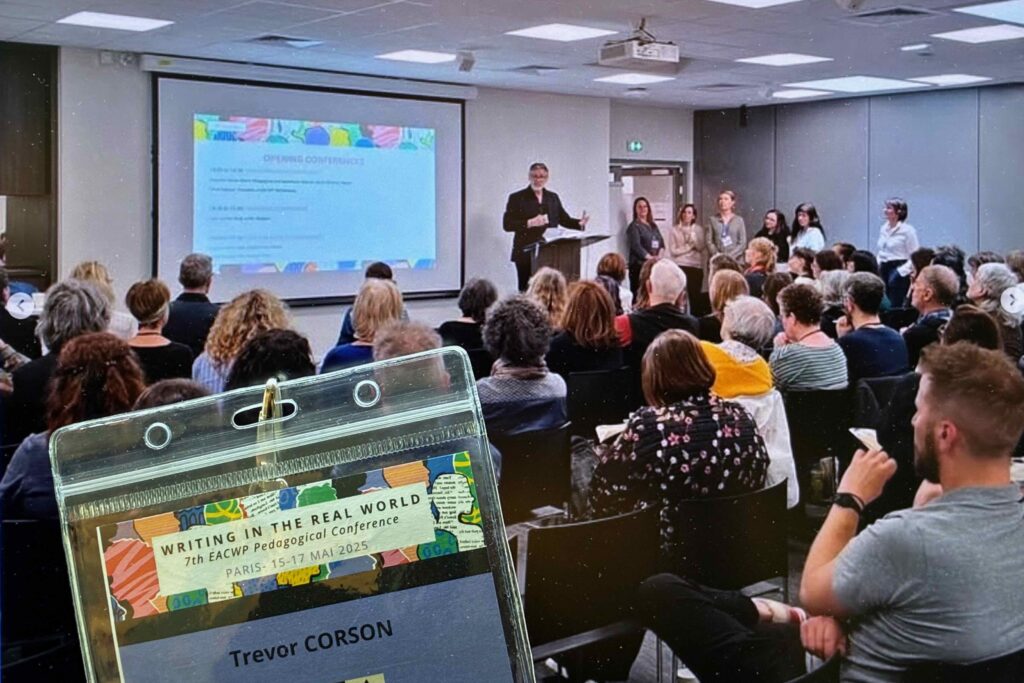European creative writing conference

NeuWrite Nordic was invited to give a presentation about what we do, and about what writers might learn from scientists, at the conference of the European Association of Creative Writing Programs (EACWP) in Paris in May. The theme of the conference was a perfect match for us: "Writing in the Real World".
NeuWrite Nordic director Trevor Corson and advisory board member Paul Graves, a poet who teaches creative writing at the University of Helsinki, both gave well-attended talks. There was a huge amount of interest in our trans-disciplinary approach—some might say undisciplined approach!—of bringing together scientists and writers in the same room for creative-writing workshops. A description of Trevor's talk is below.
Building connections
For us to attend the conference was a nice return to stronger links between Finland and EACWP. One of the original founders of EACWP in 2010 had been Reijo Virtanen, a creative writing teacher in Finland at the folk college of the arts Oriveden Opisto. Virtanen had been a much loved core member of the EACWP community until he passed away in 2020.
At the conference we exchanged ideas and built connections with others in Europe doing creative-writing work related to science, including:
- Physicist and science communicator Anna Faherty at the Wellcome Collection Reading Room in London (check out her new book, Writing Online and Audio Stories: Crafting Nonfiction for Websites, Podcasts and Social Media),
- Poet Gale Burns, who works with climate scientists through the Climate Minds Coalition, which he helped found, and
- Sonia Chalbi, based at Université de Montpellier in France, who has been tasked as a new regional "Arts, Culture and Science Officer" to develop creative-writing practices among scientists and the science-literate public in the region.
Scientists learning from writers, yes. But writers learning from scientists?
Trevor tried to push the envelope a bit with his talk at EACWP:
A Poet and a Scientist Walk Into a Writing Workshop
This talk will expand the question of diversity in the creative-writing workshop: What if diversity also means bringing in "non-creative" writers from the real world? The history, theory, & practice of the NeuWrite workshop—founded in NYC in 2009 to bring together creative writers and scientists, now with a branch in continental Europe, NeuWrite Nordic—suggests that we can integrate new craft skills and workshopping methods, and deepen diversity, by embedding with other kinds of writers.
Description:
Craft in the Real World is the title of creative-writing professor Matthew Salesses's bestselling critique of the lack of diversity in American writing workshops. Diversity should be expanded, Salesses suggests, to include narrative styles from more cultures, reflecting the realities of global literature. It's a worthy goal, although it's a goal focused mainly within creative writing. Beyond creative writing, how should we additionally think about diversity in relation to the bigger real world that includes many other sorts of writers and writing cultures? Is there space not just for teaching to, but also learning from, “non-creative” writers? What would happen if we put creative writers and, say, scientists in the same room, and asked them to workshop each other's texts? Would that get too real too fast?
Fifteen years ago in New York City, a group of creative writers and scientists asked just that question, and their answer has now come to a corner of Europe. In 2009 at Columbia University, members of the creative-writing MFA program and the departments of biological sciences and neuroscience joined forces to try something new: meeting once a month to workshop drafts of each other's articles, essays, books, talks, and scripts for audio and film aimed at general audiences. They called the new workshop NeuWrite.
In this talk by the founder and director of NeuWrite Nordic, himself an alum from the creative-writing side of the original NeuWrite at Columbia, a brief history of NeuWrite and a description of NeuWrite Nordic's first two years of operation in Europe will introduce a deeper inquiry: When diversity in a creative-writing workshop means that half the participants are not even "creative writers" but professionals in other fields, what workshopping methods even work? And, if we can find methods that work, could they be relevant for enhancing diversity within the field of creative writing, à la the more focused concerns of Salesses's Craft in the Real World? Finally, going further, is there anything creative writers can learn in a workshop setting from "non-creative" writers, such as scientists, about craft and audience? Might the real world inject us with new skills and insights?
In considering these questions, the talk will briefly reference varied sources: the Swedish "folkbildning" democratic learning methodology featured in EACWP's "text conversation" course for teachers, the "dramatization" of reader experience espoused in the workshopping model of the Columbia University Undergraduate Writing Program, the cognitive-developmental perspective on training writing skills of Ronald Kellogg, and science-studies and scientific-writing literature that center narrative and story. The talk will suggest that NeuWrite, as a writing workshop embedded in the real world beyond creative writing, may manifest some useful ways to think about diversity in creative-writing workshops generally.
Photo: EACWP president Frank Tazelaar from the Netherlands addresses the conference. EACWP on Instagram.